Abstract
The product of the CDKN2/MTS1 gene, p16(INK4A) (16), inhibits phosphorylation of the retinoblastoma protein, pRB, and thus acts as a negative cell cycle regulator. It is inactivated in a wide range of human malignancies, including breast cancer. Using an immunohistochemical approach, we studied the expression of both p16 and pRB in 104 archival breast tumors, including 63 ductal, 33 lobular, and 8 mixed carcinomas. All specimens except one were evaluable for pRB expression, but only 87 were interpretable for p16 expression, reflecting the lower abundance and greater lability of this protein. Only six tumors showed abnormal RB expression. However, 43 carcinomas (49%) were completely (35) or focally (8) negative for p16. Abnormal p16 expression did not significantly correlate with several histopathological parameters. These findings provide evidence that aberrant p16(INK4A) expression is one of the most common abnormalities in human breast cancer.
Full text
PDF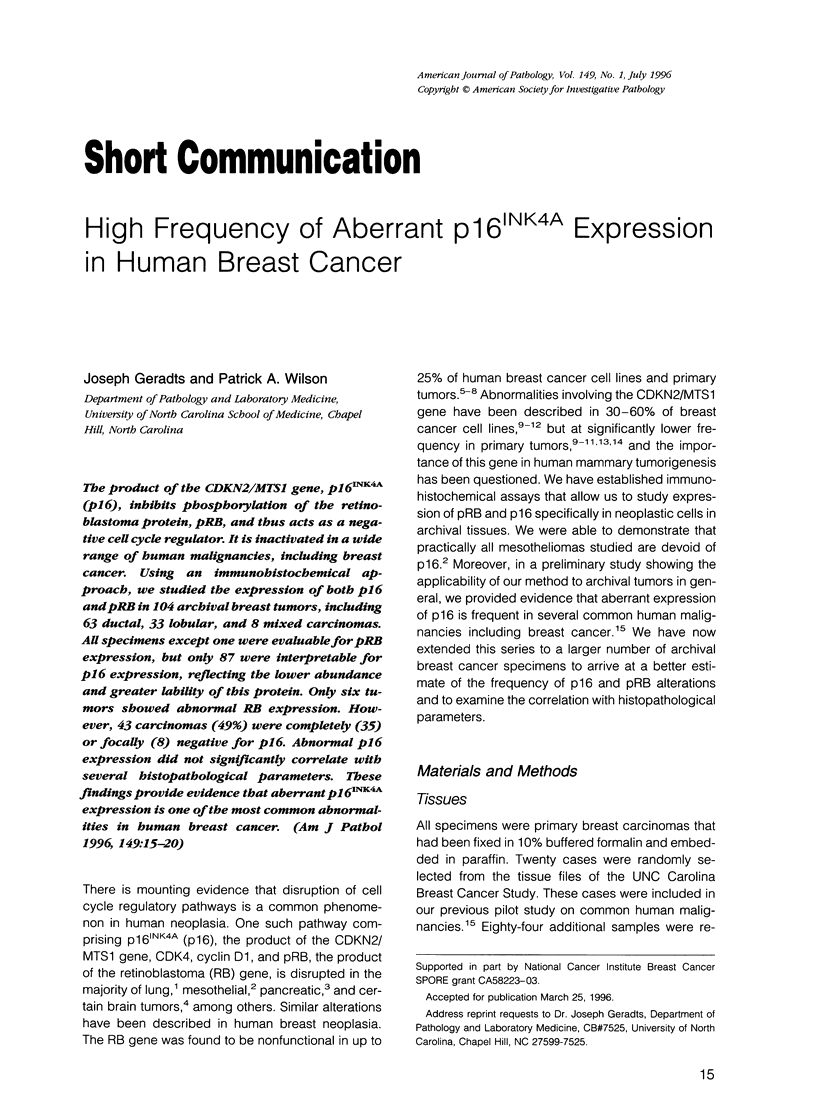
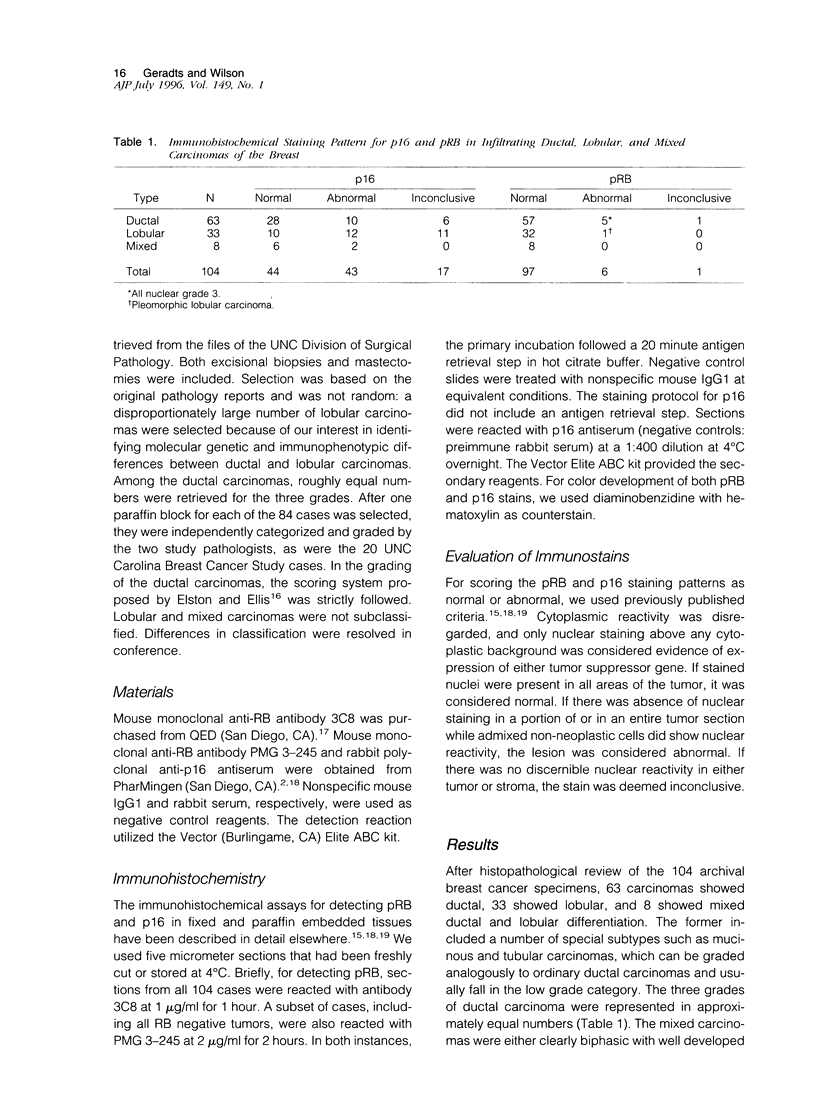
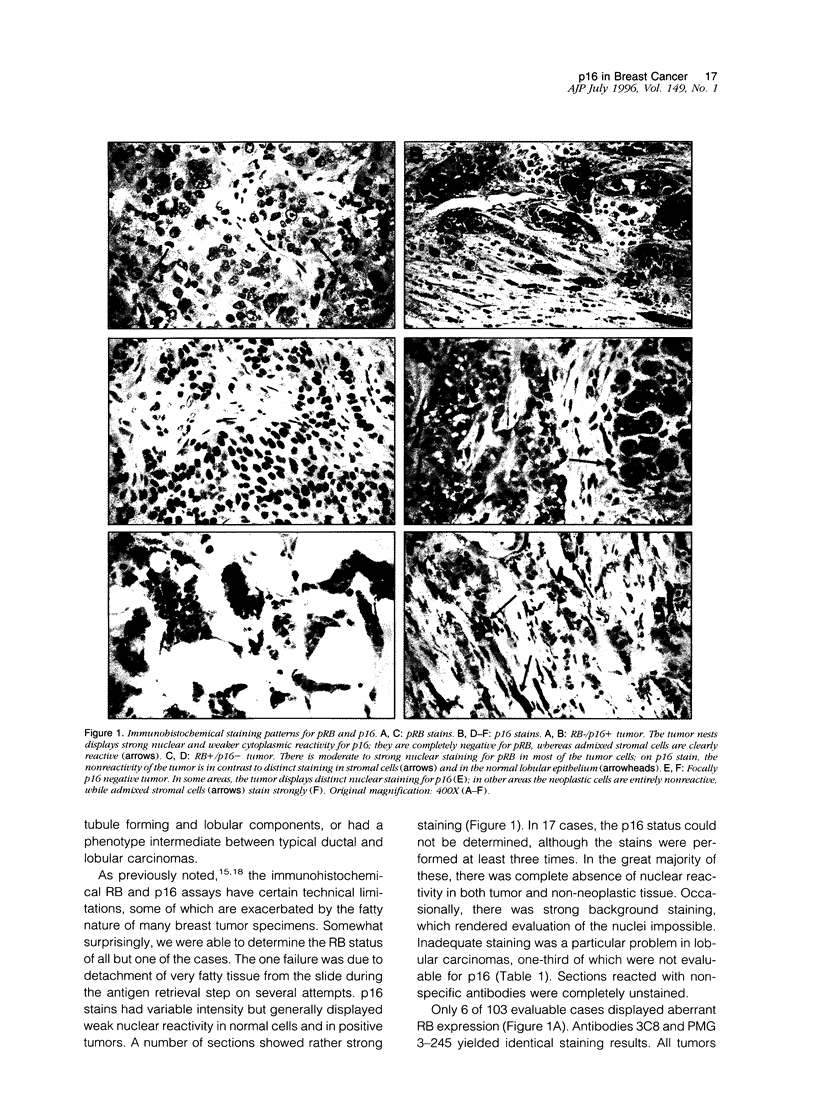
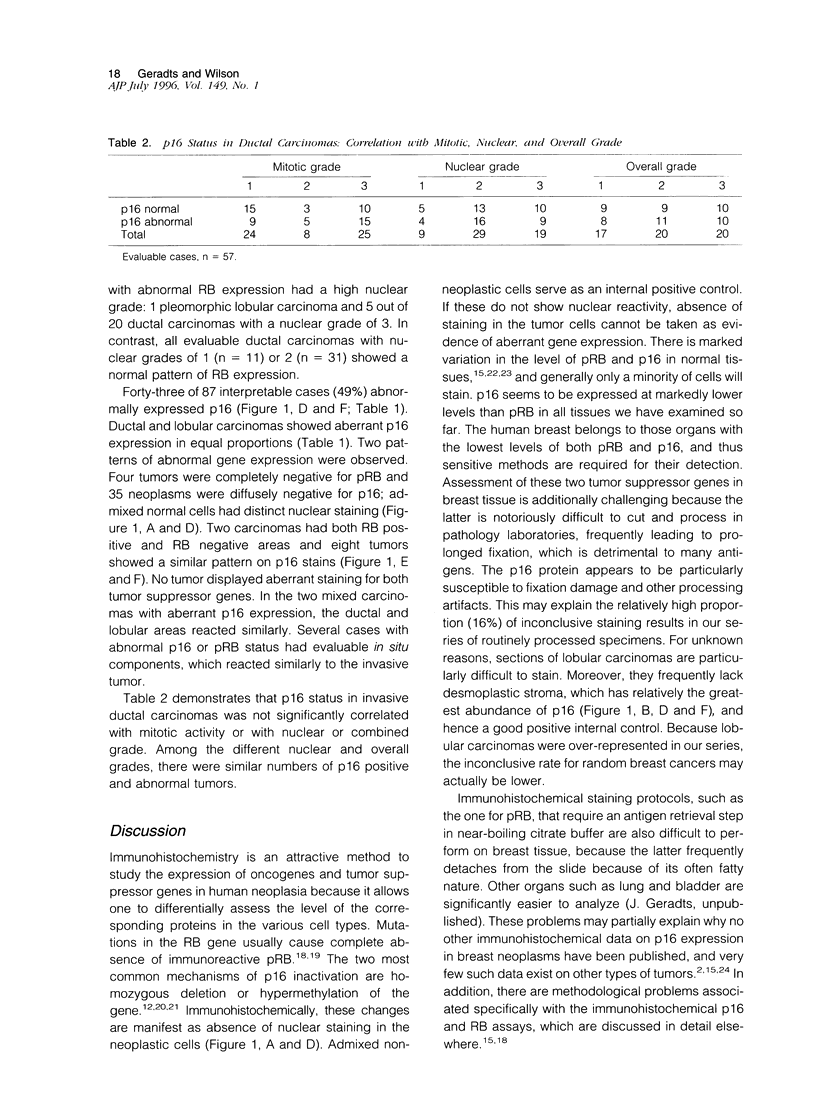
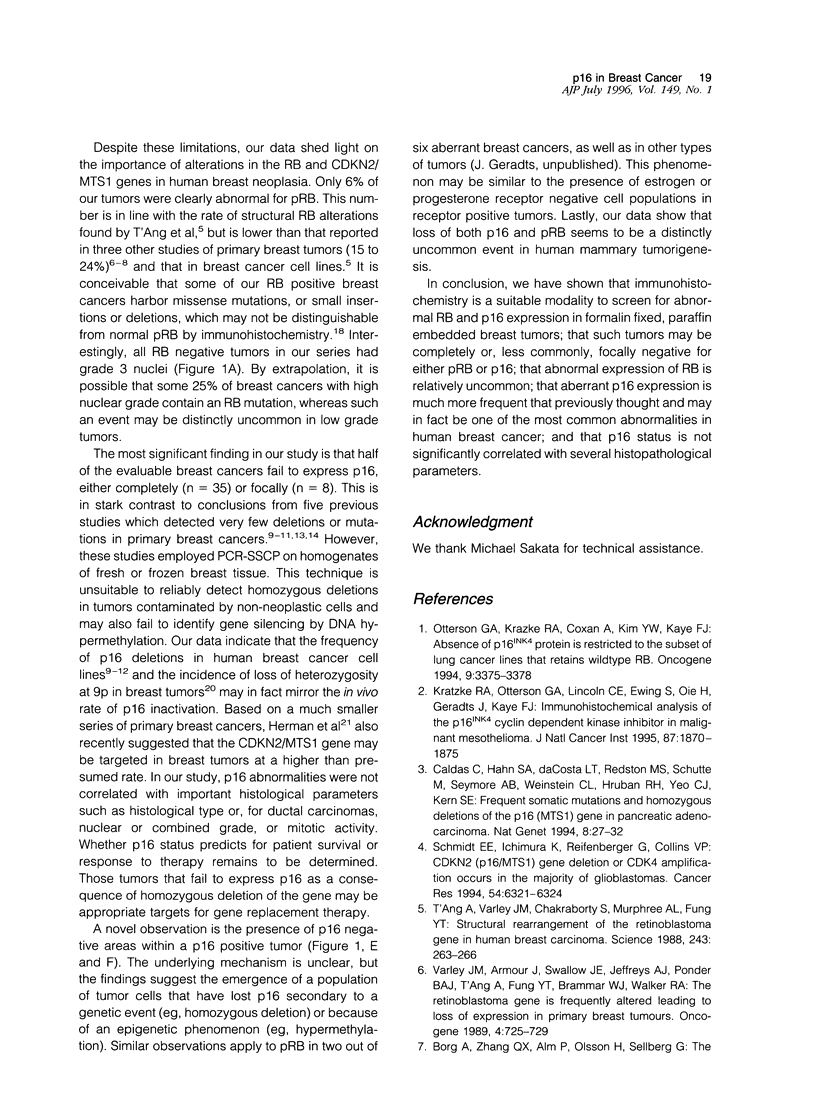
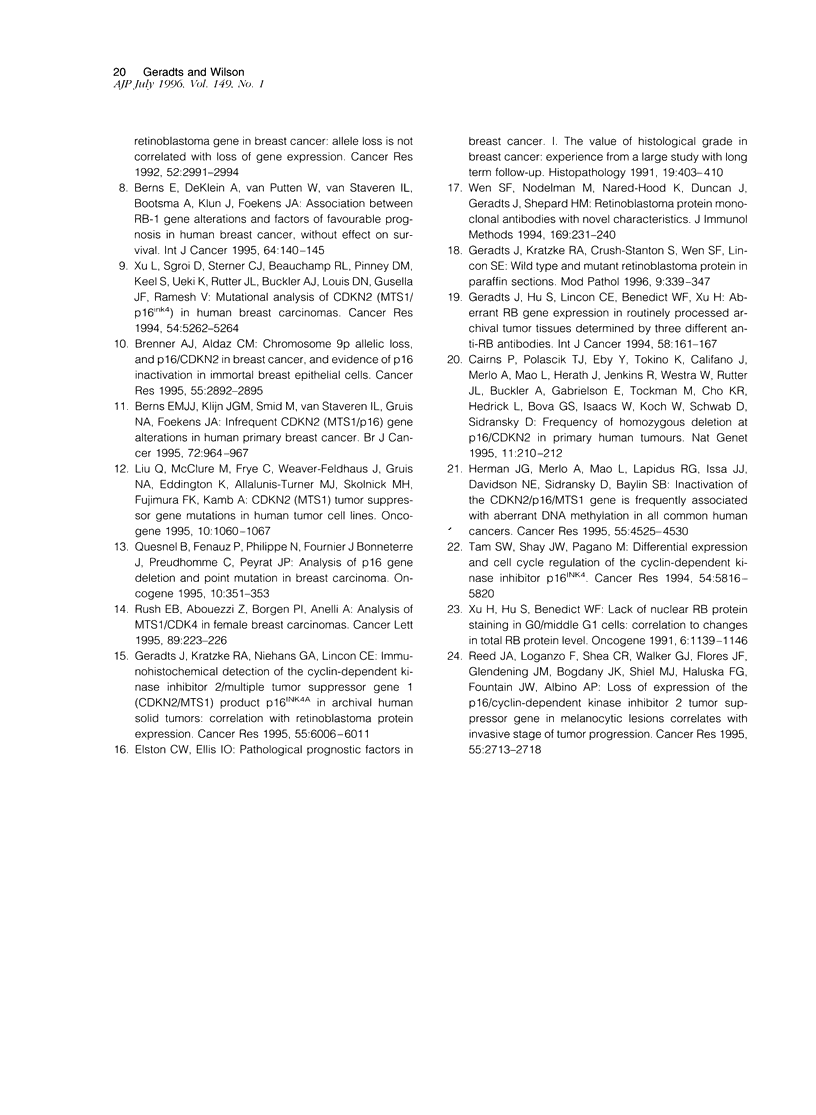
Images in this article
Selected References
These references are in PubMed. This may not be the complete list of references from this article.
- Berns E. M., Klijn J. G., Smid M., van Staveren I. L., Gruis N. A., Foekens J. A. Infrequent CDKN2 (MTS1/p16) gene alterations in human primary breast cancer. Br J Cancer. 1995 Oct;72(4):964–967. doi: 10.1038/bjc.1995.442. [DOI] [PMC free article] [PubMed] [Google Scholar]
- Berns E. M., de Klein A., van Putten W. L., van Staveren I. L., Bootsma A., Klijn J. G., Foekens J. A. Association between RB-1 gene alterations and factors of favourable prognosis in human breast cancer, without effect on survival. Int J Cancer. 1995 Apr 21;64(2):140–145. doi: 10.1002/ijc.2910640212. [DOI] [PubMed] [Google Scholar]
- Brenner A. J., Aldaz C. M. Chromosome 9p allelic loss and p16/CDKN2 in breast cancer and evidence of p16 inactivation in immortal breast epithelial cells. Cancer Res. 1995 Jul 1;55(13):2892–2895. [PubMed] [Google Scholar]
- Cairns P., Polascik T. J., Eby Y., Tokino K., Califano J., Merlo A., Mao L., Herath J., Jenkins R., Westra W. Frequency of homozygous deletion at p16/CDKN2 in primary human tumours. Nat Genet. 1995 Oct;11(2):210–212. doi: 10.1038/ng1095-210. [DOI] [PubMed] [Google Scholar]
- Caldas C., Hahn S. A., da Costa L. T., Redston M. S., Schutte M., Seymour A. B., Weinstein C. L., Hruban R. H., Yeo C. J., Kern S. E. Frequent somatic mutations and homozygous deletions of the p16 (MTS1) gene in pancreatic adenocarcinoma. Nat Genet. 1994 Sep;8(1):27–32. doi: 10.1038/ng0994-27. [DOI] [PubMed] [Google Scholar]
- Elston C. W., Ellis I. O. Pathological prognostic factors in breast cancer. I. The value of histological grade in breast cancer: experience from a large study with long-term follow-up. Histopathology. 1991 Nov;19(5):403–410. doi: 10.1111/j.1365-2559.1991.tb00229.x. [DOI] [PubMed] [Google Scholar]
- Geradts J., Hu S. X., Lincoln C. E., Benedict W. F., Xu H. J. Aberrant RB gene expression in routinely processed, archival tumor tissues determined by three different anti-RB antibodies. Int J Cancer. 1994 Jul 15;58(2):161–167. doi: 10.1002/ijc.2910580203. [DOI] [PubMed] [Google Scholar]
- Geradts J., Kratzke R. A., Crush-Stanton S., Wen S. F., Lincoln C. E. Wild-type and mutant retinoblastoma protein in paraffin sections. Mod Pathol. 1996 Mar;9(3):339–347. [PubMed] [Google Scholar]
- Geradts J., Kratzke R. A., Niehans G. A., Lincoln C. E. Immunohistochemical detection of the cyclin-dependent kinase inhibitor 2/multiple tumor suppressor gene 1 (CDKN2/MTS1) product p16INK4A in archival human solid tumors: correlation with retinoblastoma protein expression. Cancer Res. 1995 Dec 15;55(24):6006–6011. [PubMed] [Google Scholar]
- Herman J. G., Merlo A., Mao L., Lapidus R. G., Issa J. P., Davidson N. E., Sidransky D., Baylin S. B. Inactivation of the CDKN2/p16/MTS1 gene is frequently associated with aberrant DNA methylation in all common human cancers. Cancer Res. 1995 Oct 15;55(20):4525–4530. [PubMed] [Google Scholar]
- Kratzke R. A., Otterson G. A., Lincoln C. E., Ewing S., Oie H., Geradts J., Kaye F. J. Immunohistochemical analysis of the p16INK4 cyclin-dependent kinase inhibitor in malignant mesothelioma. J Natl Cancer Inst. 1995 Dec 20;87(24):1870–1875. doi: 10.1093/jnci/87.24.1870. [DOI] [PubMed] [Google Scholar]
- Liu Q., Neuhausen S., McClure M., Frye C., Weaver-Feldhaus J., Gruis N. A., Eddington K., Allalunis-Turner M. J., Skolnick M. H., Fujimura F. K. CDKN2 (MTS1) tumor suppressor gene mutations in human tumor cell lines. Oncogene. 1995 Mar 16;10(6):1061–1067. [PubMed] [Google Scholar]
- Otterson G. A., Kratzke R. A., Coxon A., Kim Y. W., Kaye F. J. Absence of p16INK4 protein is restricted to the subset of lung cancer lines that retains wildtype RB. Oncogene. 1994 Nov;9(11):3375–3378. [PubMed] [Google Scholar]
- Quesnel B., Fenaux P., Philippe N., Fournier J., Bonneterre J., Preudhomme C., Peyrat J. P. Analysis of p16 gene deletion and point mutation in breast carcinoma. Br J Cancer. 1995 Aug;72(2):351–353. doi: 10.1038/bjc.1995.337. [DOI] [PMC free article] [PubMed] [Google Scholar]
- Reed J. A., Loganzo F., Jr, Shea C. R., Walker G. J., Flores J. F., Glendening J. M., Bogdany J. K., Shiel M. J., Haluska F. G., Fountain J. W. Loss of expression of the p16/cyclin-dependent kinase inhibitor 2 tumor suppressor gene in melanocytic lesions correlates with invasive stage of tumor progression. Cancer Res. 1995 Jul 1;55(13):2713–2718. [PubMed] [Google Scholar]
- Rush E. B., Abouezzi Z., Borgen P. I., Anelli A. Analysis of MTS1/CDK4 in female breast carcinomas. Cancer Lett. 1995 Mar 2;89(2):223–226. doi: 10.1016/0304-3835(95)03691-o. [DOI] [PubMed] [Google Scholar]
- Schmidt E. E., Ichimura K., Reifenberger G., Collins V. P. CDKN2 (p16/MTS1) gene deletion or CDK4 amplification occurs in the majority of glioblastomas. Cancer Res. 1994 Dec 15;54(24):6321–6324. [PubMed] [Google Scholar]
- T'Ang A., Varley J. M., Chakraborty S., Murphree A. L., Fung Y. K. Structural rearrangement of the retinoblastoma gene in human breast carcinoma. Science. 1988 Oct 14;242(4876):263–266. doi: 10.1126/science.3175651. [DOI] [PubMed] [Google Scholar]
- Tam S. W., Shay J. W., Pagano M. Differential expression and cell cycle regulation of the cyclin-dependent kinase 4 inhibitor p16Ink4. Cancer Res. 1994 Nov 15;54(22):5816–5820. [PubMed] [Google Scholar]
- Varley J. M., Armour J., Swallow J. E., Jeffreys A. J., Ponder B. A., T'Ang A., Fung Y. K., Brammar W. J., Walker R. A. The retinoblastoma gene is frequently altered leading to loss of expression in primary breast tumours. Oncogene. 1989 Jun;4(6):725–729. [PubMed] [Google Scholar]
- Wen S. F., Nodelman M., Nared-Hood K., Duncan J., Geradts J., Shepard H. M. Retinoblastoma protein monoclonal antibodies with novel characteristics. J Immunol Methods. 1994 Mar 10;169(2):231–240. doi: 10.1016/0022-1759(94)90267-4. [DOI] [PubMed] [Google Scholar]
- Xu H. J., Hu S. X., Benedict W. F. Lack of nuclear RB protein staining in G0/middle G1 cells: correlation to changes in total RB protein level. Oncogene. 1991 Jul;6(7):1139–1146. [PubMed] [Google Scholar]
- Xu L., Sgroi D., Sterner C. J., Beauchamp R. L., Pinney D. M., Keel S., Ueki K., Rutter J. L., Buckler A. J., Louis D. N. Mutational analysis of CDKN2 (MTS1/p16ink4) in human breast carcinomas. Cancer Res. 1994 Oct 15;54(20):5262–5264. [PubMed] [Google Scholar]



